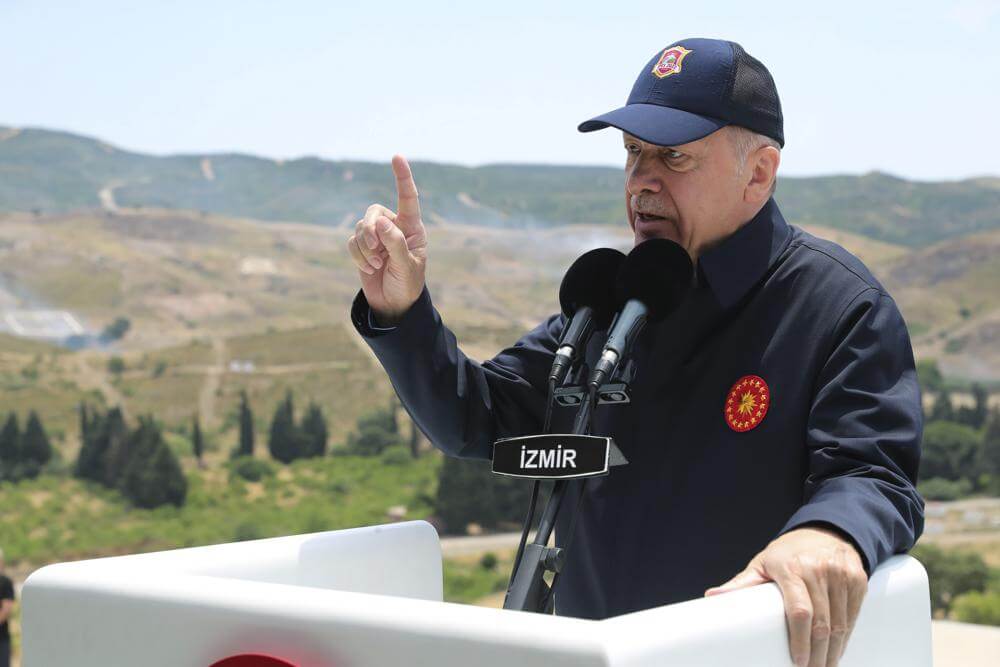Turkish President Recep Tayyip Erdoğan on Thursday warned Greece against militarising the Aegean islands amid escalating tensions between Ankara and Athens. He called on Greek authorities to behave themselves or face consequences.
“We once again warn Greece to pull itself together and stay away from dreams, rhetoric and actions that will end up with regret,” Erdoğan said. “Behave yourself. Turkey, if need be, will not hesitate to exercise its rights emanating from international agreements concerning the militarisation of [the] islands.”
Türkiye will not relinquish its rights in the Aegean and will not refrain from using the powers granted to it by international agreements for the armament of the islands when necessary.
— Recep Tayyip Erdoğan (@RTErdogan) June 9, 2022
Turkey has accused Greece of setting up defence equipment in the islands and called the move a violation of international treaties on the issue. Ankara was referring to a 1947 peace treaty between Turkey and Greece that called for the demilitarisation of the Aegean and allows for a small presence of Greek soldiers on the Dodecanese Island.
“We once again call on Greece to stop arming demilitarised islands and act in line with international agreements,” Erdoğan said. “I am not joking. I am serious,” he added.
Moreover, Erdoğan in a series of tweets in Greek admonished Athens for its stance and said that it misunderstood Ankara’s patience and composure.
Greece, however, stated that given Turkey’s military actions in the region and its violation of Greek airspace, it was compelled to defend the islands.
Government spokesperson Giannis Oikonomou responded to Erdoğan’s tweets by saying that his decision to tweet in Greek is “noteworthy” since “Greek is the language of logic, freedom and law.” He added, “The tactics chosen by Turkey do not fall into any of these versions.”
Furthermore, Oikonomou dismissed Turkey’s claims that Greece has to militarise the islands as a “myth” and “inconsistent.” “Untold allegations and vain myths can neither challenge nor, let alone, substitute for International Law and international treaties,” he remarked.
“We call on Turkey to stop its provocative tactics and realise that the only way is responsible and honest consultation,” he added.
Turkey’s systematic revisionism vs Greece (Map #1)
— The Greek Analyst (@GreekAnalyst) June 9, 2022
In 1923, Turkey relinquishes all sovereignty over islands beyond the distance of three miles from the Anatolia coast. pic.twitter.com/MeRHmvRGQH
The Greek Foreign Ministry also released a statement on Thursday showing 15 maps that countered “Turkish revisionism.” The maps “document the extent of Turkish revisionism in order to upend the status quo, violating International Law and the International Law of the Sea, and threatening peace, security and stability in our region,” the ministry claimed.
Last month, tensions escalated between Greece and Turkey after both sides accused each other of violating their respective airspaces. Turkey claimed that Greek warplanes had entered its airspace 30 times in three days. Athens, on the other hand, blamed Ankara’s jets for flying over its territory.
I said before that Erdogan would do to Greece what Putin is doing to Ukraine if Greece were not in NATO & if the power imbalance were as big between Greece & Turkey as it is between Russia & Ukraine. May have sounded radical, but I hope recent threats to Greece have made it clear
— Nick Barnets (@NickBarnets) June 9, 2022
Moreover, Greek Prime Minister Kyriakos Mitsotakis urged Washington against selling F-16 fighter jets to Turkey. Erdoğan was reportedly furious over Mitsotakis’ comments and said he would not meet the Greek leader anymore. In addition, he suspended talks aimed at resolving multiple disputes between the two sides.
Turkey also expressed concerns over Athens allowing the establishment of American military bases on Greek soil. Turkey has said that US bases pose a direct threat to Turkey and warned Greece of “playing with fire.” In fact, Washington and Athens signed a five-year military deal during Mitsotakis’ visit to improve military and defence cooperation.
Turkey and Greece have been at odds for decades over control of the Aegean and Mediterranean seas, which have vast energy reserves. The dispute involves a complex array of issues such as the ownership of territorial waters and airspace, including the question of Exclusive Economic Zones (EEZ). Both countries have dispatched warships to the Aegean Sea and violated the other side’s airspace over the EEZ dispute. Furthermore, Turkey has refused to become a signatory of the United Nations Convention on the Law of the Sea (UNCLOS), which regulates the maritime rights of countries.
Turkish president Erdogan issues a warning to Greece over Aegean Sea disputes, threatening a repeat of the Asia Minor Catastrophe of 1922 in which Greece was brutally defeated by Turkey. This IS the most serious escalation of tensions between Ankara and Athens in recent memory
— Soner Cagaptay (@SonerCagaptay) June 9, 2022
Another point of contention in bilateral relations relates to Cyprus. The island nation is divided into the internationally recognised Republic of Cyprus in the south and Northern Cyprus, which is only recognised by Ankara. Turkey occupied the island in 1974 and has tried to expand its maritime claims using the borders of Northern Cyprus.
During his speech, Erdoğan also reiterated Ankara’s commitment to eliminating Kurdish terrorists from the region. “We are gradually achieving our determined goal of taking our borders under protection with a 30-kilometre-deep security line,” he said, indicating that Turkey might invade northern Syria to fight against Kurdish militants and establish a “safe zone.”
Furthermore, he touched upon the Russia-Ukraine conflict and said that the North Atlantic Treaty Organization (NATO) “needs more unity and solidarity than ever.”
However, Turkey has also recently escalated tensions with fellow NATO members Finland and Sweden by rejecting their bid to join the alliance in the wake of Russia’s invasion of Ukraine. Ankara has accused Helsinki and Stockholm of harbouring Kurdish “terrorists” and vowed to stall their entry into NATO unless the Nordic countries extradite Kurdish militants to Turkey.

